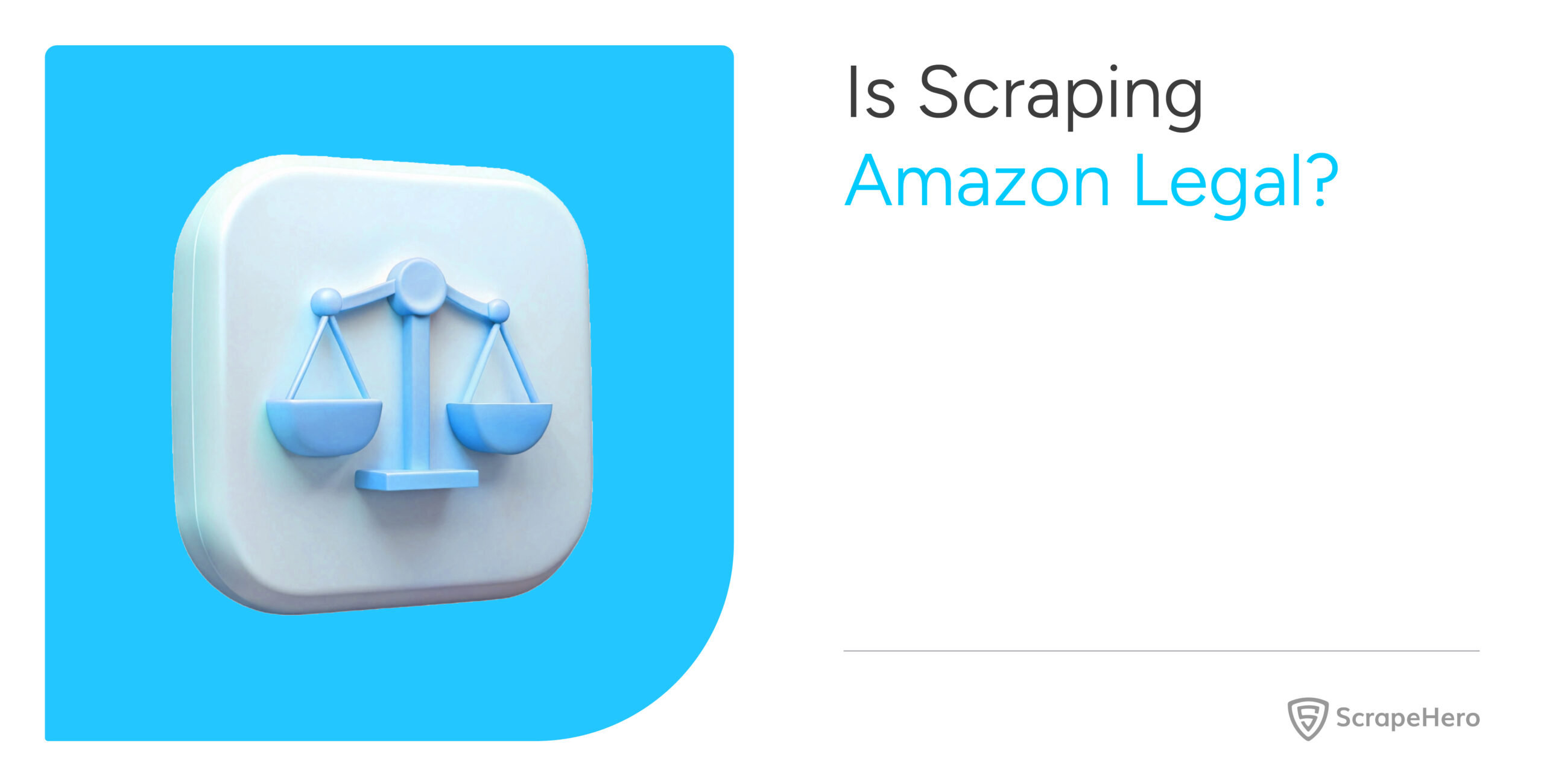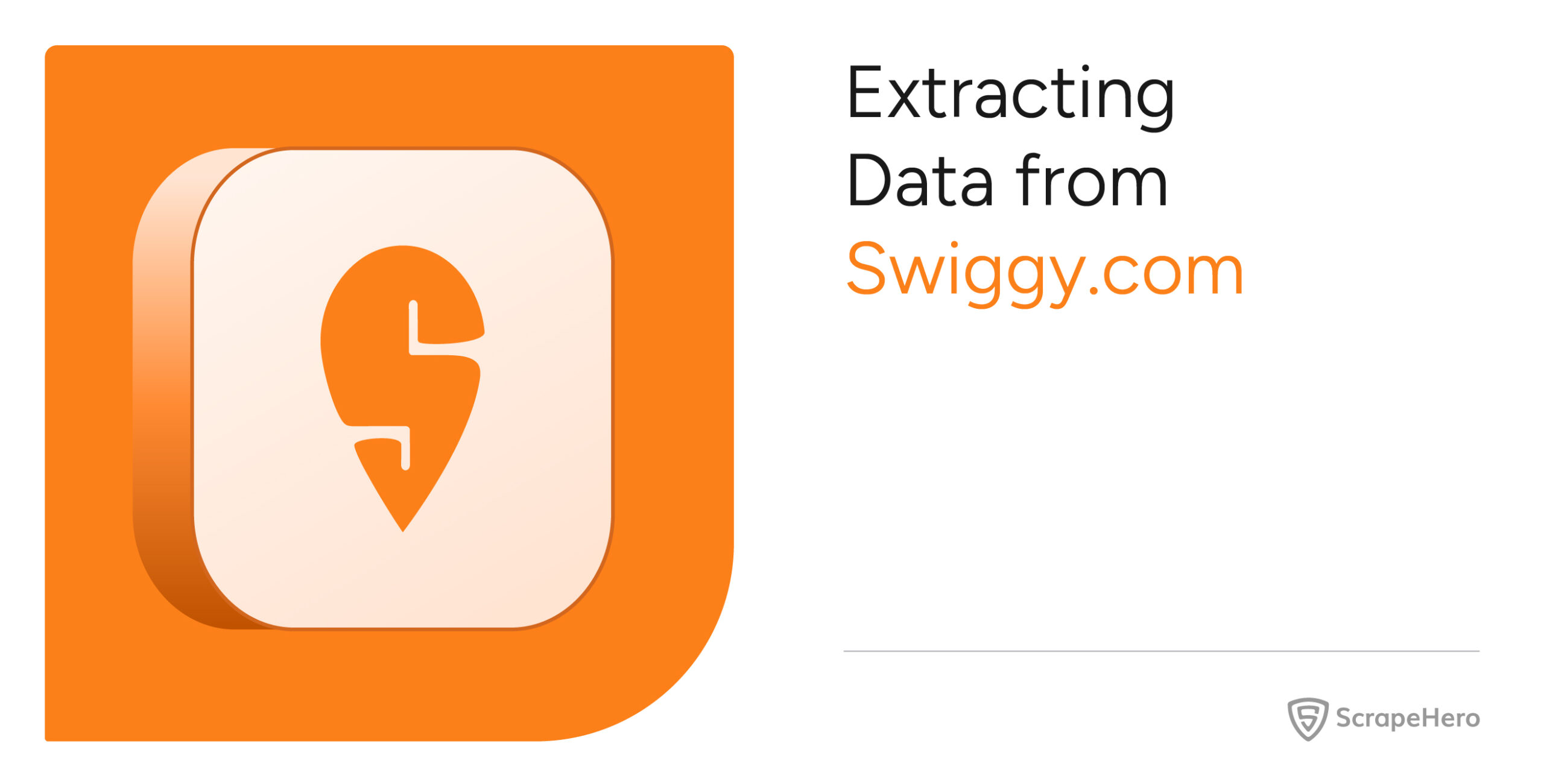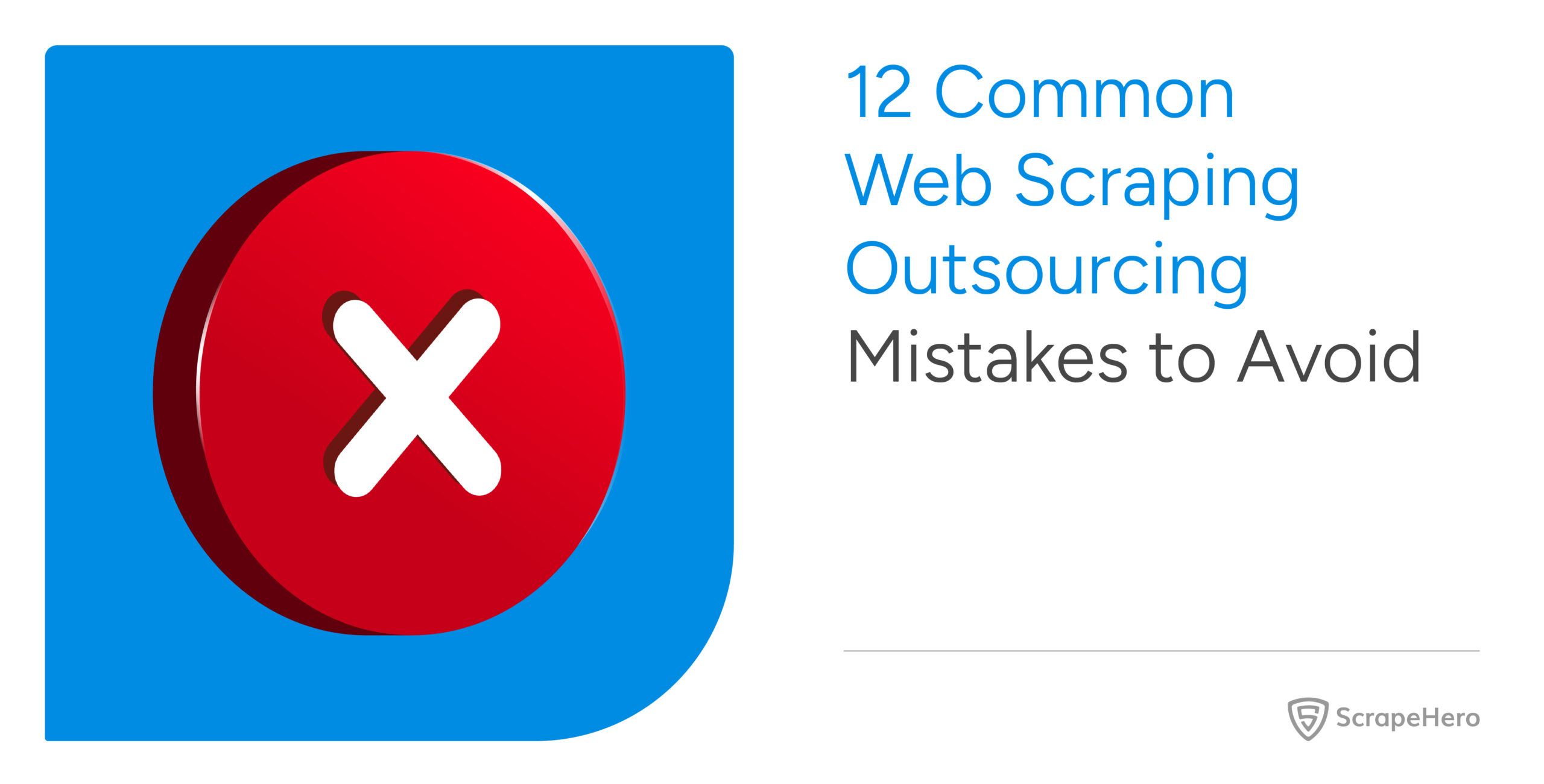Scraping Amazon without understanding its policies could land you in serious trouble.
This raises a crucial question: Is scraping Amazon legal, or could it lead to lawsuits, bans, or hefty fines?
If you want more details, read the article and learn how to stay compliant and avoid trouble while scraping Amazon.
Understanding Amazon’s Policies and Compliance
The legality of web scraping generally depends on different factors, such as jurisdiction, the type of data being scraped, and whether it violates the website’s terms of service.
Publicly available data is generally safer to scrape, but Amazon explicitly prohibits scraping in its Terms of Service (ToS).
If you try to access the data behind login walls, paywalls, or restricted areas, you may violate the ToS, which can result in account bans, legal actions, or other consequences.
The Computer Fraud and Abuse Act (CFAA) and data privacy laws like CCPA make it illegal to bypass security measures and impose strict rules on handling personal data.
So, to enforce these rules, Amazon prevents scraping through anti-bot mechanisms like IP blocking and rate-limiting.
It can even result in account terminations for unauthorized scraping, as Amazon enforces its AWS Acceptable Use Policy.
How to Ethically Scrape Amazon
Ethical web scraping balances data collection needs by respecting legal and technical boundaries.
You can access valuable data without violating policies or triggering enforcement measures if you ethically scrape websites.
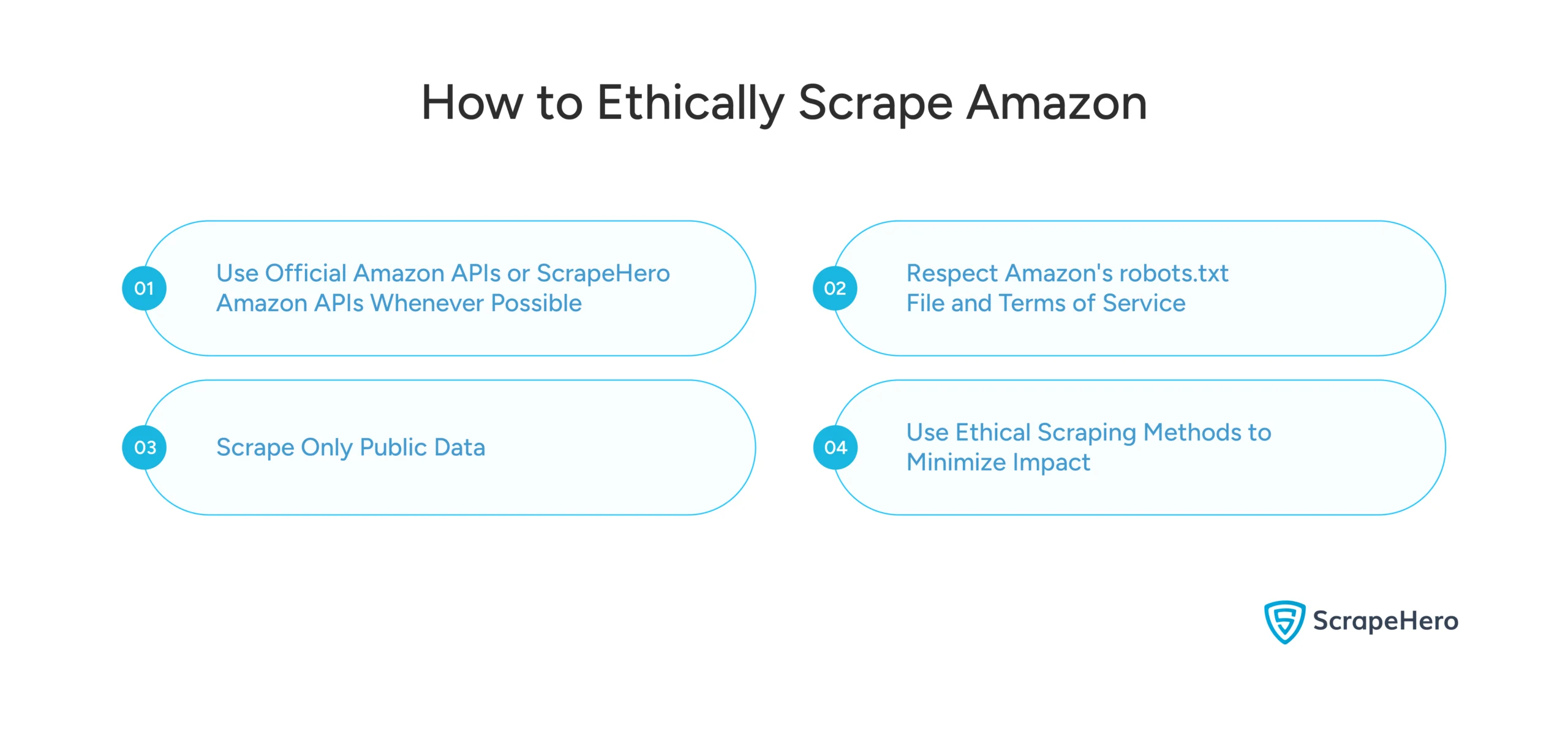
Here’s how you can ethically scrape Amazon:
1. Use Official Amazon APIs or ScrapeHero Amazon APIs Whenever Possible
One of the best ways to retrieve data without violating Amazon’s ToS is to use official Amazon APIs or trusted third-party APIs such as ScrapeHero Amazon APIs.
You can use Amazon’s official APIs to access product details, pricing, and availability.
However, Amazon’s official APIs have certain limitations, like data delays, strict rate limits, and limited data access.
By using ScrapeHero Amazon scraping APIs such as Amazon Product Details and Pricing API, you can overcome such limitations.
ScrapeHero’s Amazon scraping APIs allow you to access unlimited data without rate limits, approval requirements, or API restrictions, unlike Amazon’s official API.
If you are interested, you can also try out other Amazon scraping APIs from ScrapeHero:
- Amazon Product Reviews and Ratings API
- Amazon Search Results API
- Amazon Offer Listing API
- Amazon Best Seller API
Don’t want to code? ScrapeHero Cloud is exactly what you need.
With ScrapeHero Cloud, you can download data in just two clicks!
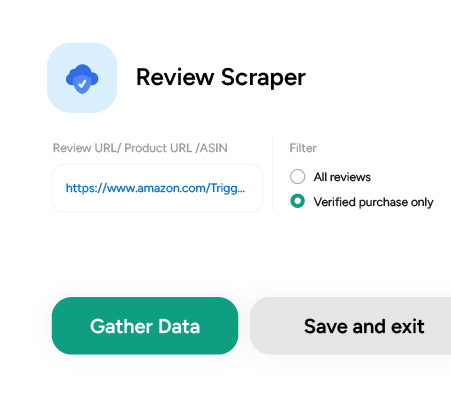
2. Scrape Only Public Data
When scraping Amazon, follow the key rules given below to avoid legal consequences, account bans, or even lawsuits.
-
Stick to Publicly Available Information
Scrape only publicly available data, including product listings, prices, descriptions, and general reviews, without personal identifiers.
You must ensure that you avoid scraping anything that needs authentication, logging in, or bypassing security measures.
-
Do Not Scrape Personal or Sensitive Data
Most customer reviews contain personal information, such as names or email addresses. You must avoid collecting these data under any circumstances.
Do not extract buyer order history, shipping details, or payment-related data, which is strictly prohibited.
-
Avoid Login-Protected Content
Avoid accessing data that is behind authentication barriers, like inventory levels visible only to sellers.
Do not violate Amazon’s Terms of Service by scraping seller dashboards, restricted reports, or business analytics.
3. Respect Amazon’s robots.txt File and Terms of Service
As mentioned earlier, Amazon’s robots.txt file sets guidelines for web scrapers regarding which parts to scrape and which are off-limits.
A robots.txt file may not always be legally binding, but it shouldn’t be ignored as it may increase the risk of detection, enforcement actions, and potential bans.
-
Read and Comply with Amazon’s robots.txt Guidelines
Read carefully Amazon’s robots.txt file, which specifies the scraping of restricted pages or directories.
Never ignore these rules, as they can lead to IP blocking, CAPTCHA challenges, or legal consequences later.
-
Review and Adhere to Amazon’s Terms of Service
Amazon prohibits scraping certain data in its Terms of Service. You must ensure that you review and comply with their latest policies to avoid account bans or lawsuits.
-
Avoid Excessive Scraping That Overloads Servers
When you send too many requests in a short time, it can flag your activity as suspicious and may lead to a ban.
To prevent detection, you can implement rate limiting and random delays between requests.
import time
import random
def scrape_with_delay():
for i in range(10): # Simulated scraping loop
print(f"Scraping request {i+1}")
time.sleep(random.uniform(2, 5)) # Waits between 2 to 5 seconds
scrape_with_delay()4. Use Ethical Scraping Methods to Minimize Impact
Ethical scraping can ensure that your activities do not overload Amazon’s servers and finally disrupt their services.
You can follow some responsible scraping practices to minimize strain on Amazon’s infrastructure and maintain data access.
-
Implement Rate Limiting to Avoid Server Strain
To reduce the number of requests in a short period, you can introduce random delays between requests, which mimic human browsing behavior.
To implement rate limiting:
import time
import random
import requests
headers = {"User-Agent": "YourBotName/1.0 (your-email@example.com)"} # Ethical bot identification
def scrape_with_rate_limit(url):
for i in range(5): # Example of 5 requests
response = requests.get(url, headers=headers)
print(f"Request {i+1}: Status Code {response.status_code}")
time.sleep(random.uniform(2, 6)) # Random delay between 2 to 6 seconds
scrape_with_rate_limit("https://www.amazon.com/dp/B09G3HRP43") # Example product URL-
Identify Your Bot with a User-Agent String
You should always include a user-agent string, as Amazon blocks requests from unidentified bots.
Also, provide contact details in your user-agent so that the website administrators can reach you if needed.
Example of setting a custom user-agent in Python:
headers = {
"User-Agent": "YourScraperBot/1.0 (your-email@example.com)"
}
response = requests.get("https://www.amazon.com", headers=headers)
print(response.status_code)-
Use Data Caching to Reduce Repetitive Requests
Avoid scraping the same product page repeatedly. Instead, store previously fetched data. To avoid unnecessary duplicate requests, you can also implement caching.
Example of a simple caching mechanism:
import os
import json
cache_file = "cache.json"
def get_cached_data(url):
if os.path.exists(cache_file):
with open(cache_file, "r") as f:
cache = json.load(f)
return cache.get(url)
return None
def save_to_cache(url, data):
cache = {}
if os.path.exists(cache_file):
with open(cache_file, "r") as f:
cache = json.load(f)
cache[url] = data
with open(cache_file, "w") as f:
json.dump(cache, f)
url = "https://www.amazon.com/dp/B09G3HRP43"
cached_data = get_cached_data(url)
if cached_data:
print("Using cached data:", cached_data)
else:
response = requests.get(url, headers=headers)
if response.status_code == 200:
save_to_cache(url, response.text)
print("Fetched new data and stored in cache")Implementing Ethical Scraping in Code
You can ethically extract publicly available product details from Amazon using Python and BeautifulSoup.
Here’s an example:
from bs4 import BeautifulSoup
import requests
import time
# Define headers with user-agent string to identify the scraper
HEADERS = {
"User-Agent": "YourCompanyBot (yourcompany@example.com)",
"Accept-Language": "en-US,en;q=0.9"
}
URL = "https://www.amazon.com/dp/B08N5WRWNW"
# Rate limit by adding a delay between requests
time.sleep(2)
response = requests.get(URL, headers=HEADERS)
if response.status_code == 200:
soup = BeautifulSoup(response.text, "html.parser")
product_title = soup.find("span", {"id": "productTitle"}).get_text().strip()
print("Product Title:", product_title)
else:
print("Failed to retrieve page.")This script respects Amazon’s guidelines by identifying itself using a user-agent string and extracting only publicly available product titles without bypassing security.
Amazon Scraping Consequences
The consequences of unethical scraping of Amazon without authorization can bring serious repercussions, including legal action.
Unethical scraping practices can even result in financial penalties and reputational damage.
Some of the key consequences that unethical scraping of Amazon can bring are explained below:
1. IP Bans: Amazon Actively Monitors and Blocks Scrapers
Amazon’s anti-scraping mechanisms can detect and block IPs that send high-volume automated requests. The blocks can be temporary or permanent, preventing further data extraction.
However, frequent bans can cost you more, as you may need to acquire new IPs or servers, which increases operational risks.
How to check whether your IP is banned:
import requests
url = "https://www.amazon.com"
response = requests.get(url)
if response.status_code == 403:
print("Your IP has been blocked by Amazon.")
else:
print("Access successful, status code:", response.status_code)Go the hassle-free route with ScrapeHero
Why worry about expensive infrastructure, resource allocation and complex websites when ScrapeHero can scrape for you at a fraction of the cost?
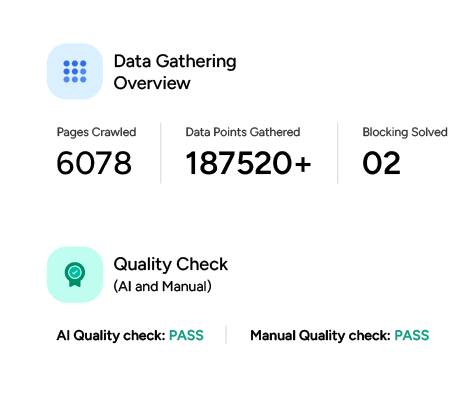
2. Amazon Data Scraping Legality: Scraping Can Lead to Lawsuits and Financial Penalties
Amazon can take legal action against businesses or individuals that violate its Terms of Service through unauthorized scraping.
If you are violating data protection laws such as the Computer Fraud and Abuse Act (CFAA), it can result in hefty fines.
These are some legal risks involved in scraping Amazon illegally:
- Breach of Terms of Service → Account termination and legal warnings.
- Unauthorized access violations → Potential lawsuits and financial damages.
- GDPR/CCPA violations → Legal liability for scraping personal user data.
3. Data Integrity Risks: Scrapers Break When Amazon Updates Its Site
Amazon frequently changes its website structure. This causes the scrapers to break or fail unexpectedly and collect incorrect or incomplete data.
If this happens, businesses relying on scrapers can experience incorrect insights, affecting decision-making.
How to handle unexpected website changes:
from bs4 import BeautifulSoup
import requests
url = "https://www.amazon.com/dp/B09G3HRP43"
response = requests.get(url)
if response.status_code == 200:
soup = BeautifulSoup(response.text, 'html.parser')
try:
price = soup.find("span", {"class": "a-price-whole"}).text
print("Product Price:", price)
except AttributeError:
print("Price element not found. Amazon may have changed its site structure.")
else:
print("Failed to fetch product page.")4. Reputation Damage: Unauthorized Scraping Can Harm Business Credibility
Ethical concerns around web scraping can negatively impact an individual’s or company’s reputation
If businesses are caught scraping without permission, the chances of facing backlash, legal scrutiny, or loss of customer trust are high.
Also, if the company’s scraping activities violate privacy laws, then it can be publicly criticized or penalized.
How ScrapeHero Web Scraping Service Can Help
The unethical scraping of Amazon can be risky and unsustainable. You must always prioritize ethical data collection methods and stay compliant with Amazon’s policies and legal regulations.
By following ethical Amazon scraping practices, you can reduce risks and ensure responsible data collection from Amazon. A complete web scraping service provider like ScrapeHero can help you with this matter.
We can assure you that our web scraping practices are legal and ethical by complying with data protection laws, respecting website terms, adapting to legal changes, and securing collected data.
No matter the scale of your web scraping needs, you can always rely on us for fast and efficient data extraction.
Frequently Asked Questions
Scraping publicly available data may be legal, but violating Amazon’s terms can lead to legal consequences.
If Amazon detects scraping, it may block your IP or take legal action.
To scrape Amazon ethically, you can use official APIs, follow Amazon’s robots.txt, and avoid bypassing security mechanisms. A better alternative is to use Amazon scrapers from ScrapeHero Cloud.
If Amazon blocks your IP, cease scraping activities, review Amazon’s terms, and consider switching to API-based data access.
Scraping Amazon for product research can be risky and, if not done ethically, can violate its Terms of Service. Even though public data might be accessible, Amazon blocks scrapers.

